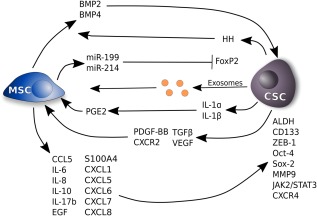Figure 3.

MSCs secretome and tumor stemness. MSCs release several factors that can induce stemness and drug resistance or maintain the CSCs phenotype. MSCs produce BMP4 and 2 increasing CSCs number in ovarian cancer. CSCs, in turn, activate Hh pathway. MSCs can induce an increase of mir‐199 and mir‐214 leading to a repression of FoxP2 promoting metastasis and maintenance of CSCs phenotype. IL‐1α and IL‐1β secreted by cancer cells induce the production of PGE2, IL6, and IL8 by MSCs. This leads to a secretion of IL‐6, CXCL1, and CXCL8 by MSCs increasing stemness characteristics. MSCs are able to increase the number of breast cancer cells positive to ALDH by secretion of CXCR2 ligands inducing expression of Oct4 and Sox2. IL‐6 secreted by MSCs leads to an increase of CSCs expressing CD133 by JAK2‐STAT3 pathway. Irradiated breast cancer cells increase the release of TGFβ1, VEGF, and PDGF‐BB, which activate the migration of MSCs to cancer cells. Moreover, cocultures of MSCs with breast cancer cells increases the production of CXCR2 ligands including CXCL1, 5, 6, 7, and 8 that are able to increase the percentage of CSCs. Also, IL‐10, IL‐17b, and EGF, secreted by MSCs, are involved in increasing breast CSCs number. MSCs can also lead to an increase of CCL5 expression that, in turn, induce an increase of CSCs by upregulation of ZEB1, MMP9, and CD133 in prostate cancer. MSCs can also regulate the metabolism of CSCs through secretion of exosomes in breast cancer and cholangiosarcomas. Abbreviations: ALDH, aldehyde dehydrogenases; CSC, cancer stem cell; EGF, endothelial growth factor; HH, hedgehog; MSC, mesenchymal stem cell; PDGF‐BB, platelet‐derived growth factor BB; VEGF, vascular endothelial growth factor.
